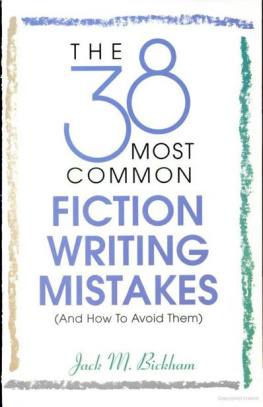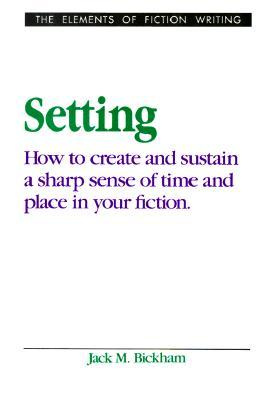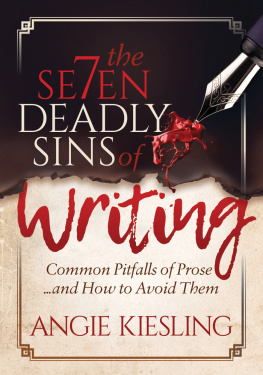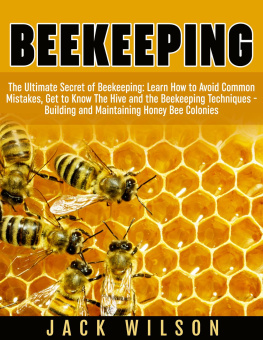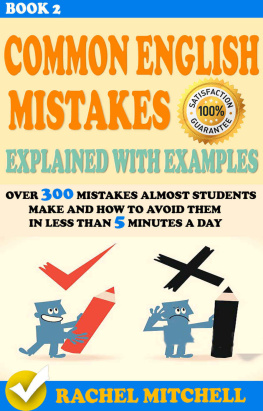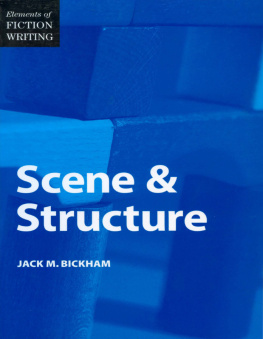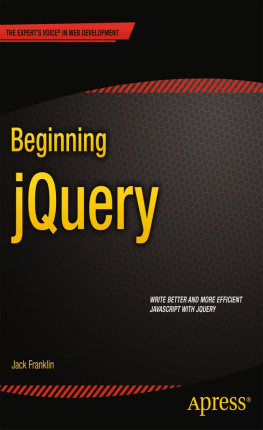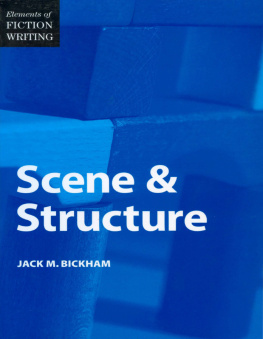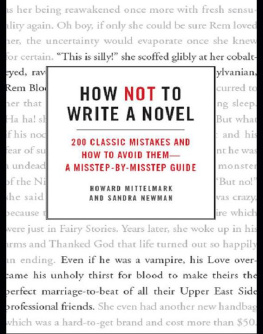Jack M. Bickham - The 38 Most Common Fiction Writing Mistakes (And How to Avoid Them)
Here you can read online Jack M. Bickham - The 38 Most Common Fiction Writing Mistakes (And How to Avoid Them) full text of the book (entire story) in english for free. Download pdf and epub, get meaning, cover and reviews about this ebook. year: 1992, publisher: Writers Digest Books, genre: Art. Description of the work, (preface) as well as reviews are available. Best literature library LitArk.com created for fans of good reading and offers a wide selection of genres:
Romance novel
Science fiction
Adventure
Detective
Science
History
Home and family
Prose
Art
Politics
Computer
Non-fiction
Religion
Business
Children
Humor
Choose a favorite category and find really read worthwhile books. Enjoy immersion in the world of imagination, feel the emotions of the characters or learn something new for yourself, make an fascinating discovery.
- Book:The 38 Most Common Fiction Writing Mistakes (And How to Avoid Them)
- Author:
- Publisher:Writers Digest Books
- Genre:
- Year:1992
- Rating:3 / 5
- Favourites:Add to favourites
- Your mark:
- 60
- 1
- 2
- 3
- 4
- 5
The 38 Most Common Fiction Writing Mistakes (And How to Avoid Them): summary, description and annotation
We offer to read an annotation, description, summary or preface (depends on what the author of the book "The 38 Most Common Fiction Writing Mistakes (And How to Avoid Them)" wrote himself). If you haven't found the necessary information about the book — write in the comments, we will try to find it.
The 38 Most Common Fiction Writing Mistakes (And How to Avoid Them) — read online for free the complete book (whole text) full work
Below is the text of the book, divided by pages. System saving the place of the last page read, allows you to conveniently read the book "The 38 Most Common Fiction Writing Mistakes (And How to Avoid Them)" online for free, without having to search again every time where you left off. Put a bookmark, and you can go to the page where you finished reading at any time.
Font size:
Interval:
Bookmark:
The 38 Most Common Fiction Writing Mistakes (and How to Avoid Them).
Copyright 1992 by Jack M. Bickham. Printed and bound in the United States of America. All rights reserved. No part of this book may be reproduced in any form or by any electronic or mechanical means including information storage and retrieval systems without permission in writing from the publisher, except by a reviewer, who may quote brief passages in a review. Published by Writer's Digest Books, an imprint of F+W Publications, Inc., 4700 East Galbraith Road, Cincinnati, Ohio 45236. (800) 289-0963. First Paperback Printing 1997.
Visit our Web site at www.writersdigest.com for information on more resources for writers.
To receive a free weekly e-mail newsletter delivering tips and updates about writing and about Writer's Digest products, send an e-mail with the message "Subscribe Newsletter" in the body of the message to newsletter-request@writersdigest.com, or register directly at our Web site at www.writersdigest.com
11 10 09 08 07 14 13 12 11 10
Library of Congress Cataloging-in-Publication Data
Bickham. Jack M.
The 38 most common fiction writing mistakes and how to avoid them / Jack M. Bickham.
p. cm.
Includes index.
ISBN-13: 978-0-89879-821-0 (pbk.)
ISBN-10: 0-89879-821-3 (pbk.)
1. FictionTechnique. 2. Authorship I. Title. II. Title: The thirty-eight most common fiction writing mistakes and how to avoid them.
PN3355.B47 1992
808.3dc20 91-32293
CIP
Edited by Bill Brohaugh
Designed by Sandy Kent
The preliminary section of a book is often labeled a "foreword." But in a book involving fiction technique, the word ought to be "Forward."
Why?... To emphasize two vital points: All good fiction moves forward; all good fiction writers look ahead.
In more than twenty years of teaching courses in professional writing at the University of Oklahoma, I think I've encountered almost every difficulty an aspiring writer might face. (Once, I had a young male student who was both deaf and blind. He required a companion in the classroom to tap her fingers against his hand during my lectures to spell out my words.) But by far the most commonand cripplingproblem for students over the years was the tendency to write static copy that didn't have forward movement. And the second most common problem was the habit of looking backwardsat past mistakes and disappointments, or at worries about the part of the story already writtenrather than ahead, where all the potential... all the challenge... all the excitement and triumph... have to be.
So, despite the fact that I've chosen to write this book from what seems a negative stance, telling you what you shouldn't do, please don't fall into the trap of thinking negatively, or backwards, about your writing. My hope is that by seeing a common error stated boldly in the section heading, you will look harder at your own copy to see if you might be committing the same mistake. But my message is positivealways. In every section you'll find a common mistake described, but you'll also find how to avoid that error, or build in a strength as a replacement for a previous weakness.
Nothing can erode your powers more than a negative attitude.
Nothing can cripple your fiction more than looking at it backwards, as a static artifact or "done deal" rather than a living, forward-moving, dynamic series of inventions.
So you'll be reading a lot of "don't" statements in the following pages. But that's partly just to get your attention. Remember, behind every negative is a positive.
Just as behind every rejection there's a triumphant saleif you'll just persevere.
So let's move on, now... forward.
J. M. B.
Writers are a favorite subject for cartoonists, from Charles Schulz of Peanuts fame to those who contribute to The New Yorker. (You can't blame them for picking on writers; we are sort of weird.) Over the years I've haphazardly collected such cartoons, and some of my favorites are taped to the door of my office.
One of these shows a nonwriter telling a weary novelist at an autograph party, "Gosh! I know I could write a novel too, but I've just never found the time!"
Another, in two panels, is titled, "Writer's Block." The first panel shows the writer standing idle in his writing room; that panel is captioned "Temporary." In the second panel, the erstwhile writer is standing in the doorway of his fish store; that panel is captioned "Permanent."
A third cartoon shows a writer at his typewriter, telling his wife, "I just can't start until inspiration strikes." Subsequent panels show him in the same positionnothing doneand getting older... and older... and older.
I don't know how funny these cartoons really are, but I like them because they illustrate the primary habit that separates the writers from the pretenders. The world is brimming over with people good enough to make a living as writers. Thank goodnessfor those of us who are working, and don't need any more competitionmost such talented people spend their creative energies making excuses, and never quite get around to the job at hand.
If you are serious about the craft of fiction, you must never make excuses for yourself You simply cannot allow yourself to:
Say you're too tired.
Postpone work until "later."
Fail to work because you're too busy right now.
Wait for inspiration.
Plan to get right at it "tomorrow."
Give up because (editors) (agents) (readers) (critics) are unfair. (Fill in as many as you want.)
Tell yourself you're too old (or too young) to start.
Blame others in your family for your lack of free time.
Say your job is too demanding to allow you any other activity.
Tell yourself that your story idea isn't good enough.
Or any of a host of other excuses you may dream up for yourself.
No. Let's get this straight right away: Writers write; everyone else makes excuses.
Nothing short of a genuine tragedy in your life should be allowed to intrude into your regular work as a writer of fiction. Do you really think successful writers have unlimited time, face no other demands on them, are always peppy and eager to face the keyboard? Of course not! Writing can be tremendous fun, and wonderfully rewarding. But writing is hard work.
Let me repeat.
Writing is hard work.
Nobody really enjoys hard work day after day, week after week. Everybody wants sometimes to get away and play, or just be lazy. When a project such as a novel is going badly, the writer never wants to face her day's stint at the keyboard. At such times, excuses come easily. But the professional simply does not let herself off so easily. All the excuses, all the complaints, all the alternatives to work, must be fought through; the real writer will work. And regularly.
Consider: If you write only one page a day, by the end of one year you will have a 365-page novel. Take the next year to rewrite it at the same pace, and you will have a finished novel to show to an agent or editor, which is about the same output that many best-selling novelists have.
If, on the other hand, you make excuses for yourself half the time, then at best it will take you four years to have a book ready. That's too long.
And if you make excuses for yourself three-fourths of the time, you will probably lose so much momentum that you'll never finish your project at all.
Consistent, persistent, even dogged work, day in and day out, is the professional's way. And if at the end of a long period of dogged work, your story happens to be rejected, you can't afford to use the rejection as an excuse to quit producing, either. All writers produce some unassailable work. All writers get discouraged, tired and worn down. The good ones don't make excuses. They keep going.
Next pageFont size:
Interval:
Bookmark:
Similar books «The 38 Most Common Fiction Writing Mistakes (And How to Avoid Them)»
Look at similar books to The 38 Most Common Fiction Writing Mistakes (And How to Avoid Them). We have selected literature similar in name and meaning in the hope of providing readers with more options to find new, interesting, not yet read works.
Discussion, reviews of the book The 38 Most Common Fiction Writing Mistakes (And How to Avoid Them) and just readers' own opinions. Leave your comments, write what you think about the work, its meaning or the main characters. Specify what exactly you liked and what you didn't like, and why you think so.

